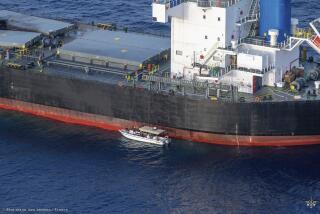With U.N. Approval, Ship Brings Fuel to Haiti : Embargo: Authorized delivery is meant to ease the impact of economic sanctions on the poor.
- Share via
PORT-AU-PRINCE, Haiti — A faded red tanker slipped into Port-au-Prince’s harbor at dawn Friday and unloaded 400,000 gallons of gasoline and diesel fuel in an officially sanctioned violation of the economic embargo of Haiti’s military dictatorship.
The shipment was authorized by the United Nations under pressure from the United States, which is concerned that public revulsion over the deadly impact of the sanctions on Haiti’s desperately poor majority could ultimately weaken the Clinton Administration’s effort to force the military out of power.
Haiti has been under an international boycott since mid-October, when the military reneged on an agreement to permit the return of President Jean-Bertrand Aristide, who has lived in exile in the United States since his violent overthrow in 1991.
Rather than force the military to accept Aristide’s return, however, the embargo, particularly against the importation of fuel, has all but destroyed the country’s economy and infrastructure and has pushed much of the impoverished majority to--if not over--the edge of starvation.
That situation led the United States to ease the embargo and permit enough fuel in to allow such groups as CARE, Catholic Relief Services and others to restore deteriorating feeding programs.
The tanker, named the Eupleta Douglas and accompanied by a destroyer sent by the United Nations, was tied up to the petroleum dock for no more than nine hours in hopes of avoiding threatened efforts to prevent either its docking or unloading.
The day passed without incident, unlike the events of Oct. 11, when a U.S. military cargo ship, the Harlan County, was prevented from landing and unloading unarmed Army engineers and road-building equipment by a rampaging mob sponsored by Haiti’s military leaders.
Despite threats to repeat the Harlan County episode, no attempts were made to keep the Eupleta Douglas away from the unloading pipe or to interfere with the pumping operation.
But the danger is not over, according to diplomats, even though the military high command has pledged not to interfere with the distribution of the fuel--300,000 gallons of which is dedicated strictly to non-governmental humanitarian agencies.
“The great fear now,” one diplomat said, “is when they (the humanitarian groups) come to get the gas. There is no way we can protect them; they will be on their own.”
Various groups, all virulently anti-Aristide, have threatened to stop trucks trying to pick up the fuel or even to steal it on grounds that the distribution is not truly equitable.
According to U.N. spokesman Erik Falk, starting Monday approved agencies will be allowed to buy specified amounts of fuel for $1.20 a gallon, with smaller groups getting 100 gallons and larger ones, such as CARE, as much as 20,000 gallons.
With 100,000 gallons being kept in reserve for emergencies, the remaining 300,000 is supposed to last two months. According to Douglas Greene of Catholic Relief Services, the fuel will permit his organization to resume two feedings a day for the 170,000 people it serves in Port-au-Prince and nearby cities.
Officials of CARE, which normally provides daily meals to about 600,000 people, mostly in the impoverished northwest, said they had been forced by a lack of fuel to cut back to feeding only 200,000 on some days.
The new shipment, if it holds together, will enable CARE to restore its program at least until mid-February.
One segment of Haiti that has survived is the bull’s-eye of the embargo target: the military. According to diplomats and other sources close to the army high command, the military has about 200,000 gallons of fuel in storage and is smuggling in enough from the neighboring Dominican Republic to resell at a large profit.
“The border is leaking like a sieve,” one foreign military expert said. “The military is selling it to the country’s electric and telephone companies and then using part of the profits to pay its soldiers.
“They don’t care about the people, and as far as I can tell they have no plans to deal with, let alone solve, the conflict with the world.”
More to Read
Sign up for Essential California
The most important California stories and recommendations in your inbox every morning.
You may occasionally receive promotional content from the Los Angeles Times.












